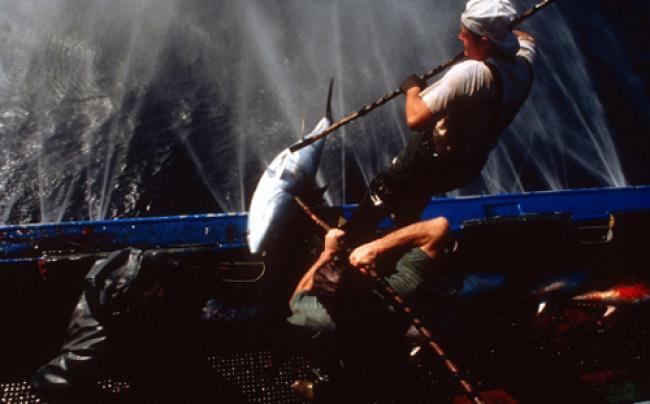Economy
World / Countries / MNCs UN initiative to advance high seas fisheries management
06 Nov 2013, 12:31 pm Print

New York, Nov 6 (JEN): The United Nations Food and Agriculture Organization (FAO) Tuesday hailed a multi-partner project focused on improving global sustainable tuna fisheries by reducing illegal catch and supporting biodiversity in the common oceans.
“High-seas fisheries support the food security and livelihoods of millions of people worldwide,” Árni M. Mathiesen, FAO Assistant Director-General for Fisheries and Aquaculture said in a statement announcing that Global Environment Facility (GEF) CEO Naoko Ishii has approved a project coordinated by FAO to boost the sustainability of tuna fisheries worldwide.
According to FAO, around one third of the world’s seven major tuna species are currently overexploited. Given continued strong consumer demand and the overcapacity of fishing fleets, the status of tuna stocks is likely to deteriorate further if fisheries management is not improved.
“Through collective action at all levels and broad cooperation that optimizes the use of scarce resources, this project – and the wider Common Oceans initiative – will help move the world away from ‘the race to fish’ and towards implementation of an ecosystem approach,” said Mathiesen, stressing that it is vital to ensure the future well-being and productivity of these crucial marine ecosystems.
“Early successes will create incentives for donors and agencies to further invest in these types of catalytic projects.” he added.
By creating synergy between FAO and its global partners, the global tuna project on fisheries management and biodiversity conservation, set to run from 2013 through 2018, is vital to advance more sustainable and efficient fisheries management and to share the best fishing practices; to reduce illegal, unreported and unregulated (IUU) fishing through reinforced monitoring and control; and to lessen ecological impacts from illegal fishing.
The GEF, an international organization specialized on environment and sustainable development, has committed USD 30 million in support of the program, leveraging an addition USD 150 million of co-financing.
“I am pleased that we are able to bring together both public and private partners in this project, which give us a fighting chance to work on a scale sufficient to reverse negative trends threatening the global tuna fishery and the ocean environment that sustains it” said Ishii, commented on GEF’s funding.
Further to the tuna project, key partners including FAO, the UN Environment Program (UNEP), the World Bank, Conservation International (CI), the International Union for Conservation of Nature (IUCN), the World Wildlife Fund – US and the Global Oceans Forum are also involved in other relevant initiatives:
Increasing sustainable use of deep-sea living resources and ecosystems; strengthening global capacity to manage the areas beyond national jurisdiction (ABNJ) and fuelling oceans partnerships to promote investment in long-term, sustainable fisheries management.
FAO estimates that tunas and tuna-like species account for the most valuable fishery resource caught in the areas beyond national jurisdiction (ABNJ). About 5.4 million tonnes are landed each year, with over 85 countries harvesting tuna in commercial quantities. Capture levels are highest in the Pacific Ocean, followed by the Atlantic and Indian Oceans.
FAO estimates that about one third of the world’s seven major tuna species are currently overexploited. Photo: FAO/A. Urcelayeta
More Economy






